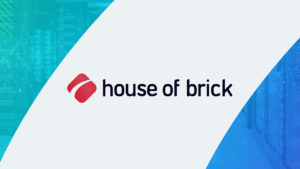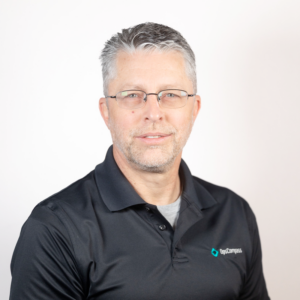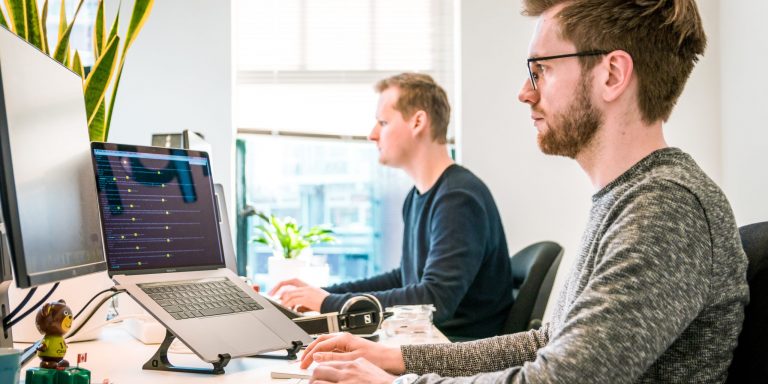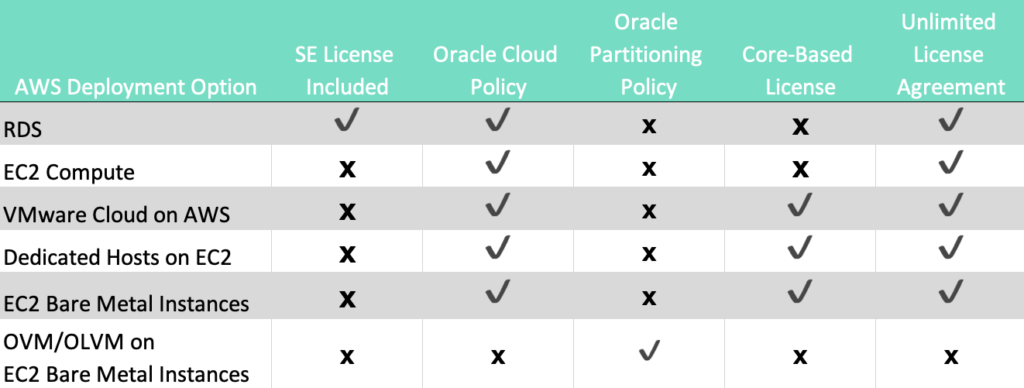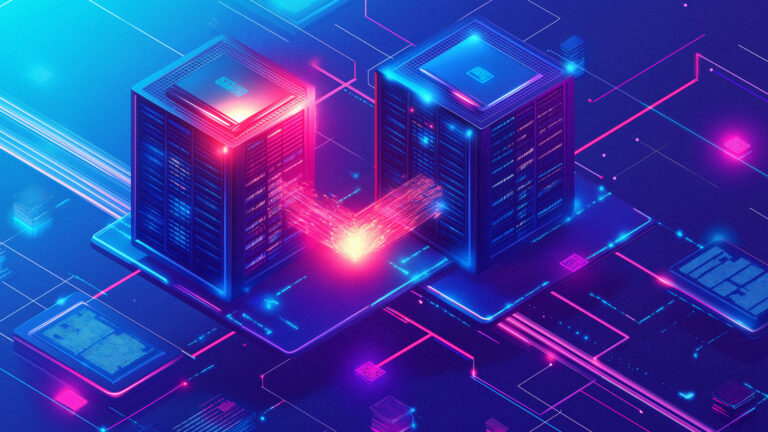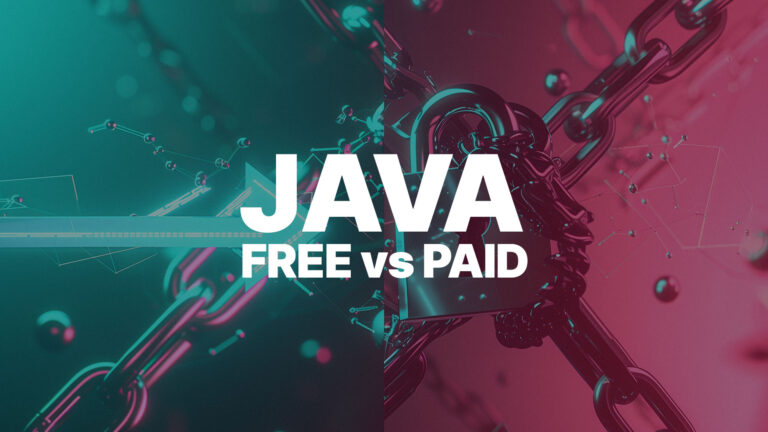Overview
AWS provides the option for installing your own operating system (OS) or hypervisor on their physical hosts. While this is not a common way to deploy workloads on AWS, it does provide additional options in certain situations. For those familiar with Oracle’s Partitioning Policy, the only X86-based hypervisors listed are Oracle’s hypervisors. This blog discusses the licensing implications for running Oracle hypervisors on AWS bare metal hosts.
Oracle Licensing Options on AWS
There are several ways to run your Oracle workloads on AWS. The options for licensing are different for each scenario.
- EC2 instances
- EC2 dedicated hosts
- RDS license included
- RDS bring your own license (BYOL)
- AWS bare metal server
For EC2 instances, the only practical way to license Oracle workloads is to use Oracle’s cloud licensing policy. The cloud licensing policy dictates how cores are counted for AWS EC2 instances.
- Two EC2 vCPUs are counted as one license with HyperThreading (HT) enabled
- One EC2 vCPU is counted as one license with HT disabled
Oracle’s Core Factor Table describes how many licenses are required for different CPU architectures. With Oracle’s Cloud Licensing Policy, the core factor table does not apply. Using the Cloud Licensing Policy equates to one core counted as one Oracle license, thereby cutting the processing power per Oracle license in half versus on-premises X86 hardware.
- On-premises X86 hardware – one oracle license = two physical cores, or 4 HyperThreads
- Cloud Licensing – one oracle license = one physical core, or 2 HyperThreads
EC2 dedicated hosts are essentially just collocated servers running the AWS hypervisor. They are licensed similar to on-premises servers where all cores in the physical host are counted towards license consumption. The core factor table is applied as usual.
RDS license included is just as the name implies. The Oracle license is included in the cost of the RDS instances.
RDS BYOL is licensed the same as EC2 instances, using Oracle’s cloud licensing policy.
AWS bare metal servers are similar to EC2 dedicated hosts, with the difference being there is no OS installed on a Bare Metal server. AWS bare metal servers are licensed the same as an on-premises physical server where all cores are counted.
AWS Bare Metal Servers
AWS bare metal servers are allocated without the EC2 OS and hypervisor installed. Instead, the end customer is responsible for installing and configuring an OS on the server. Any OS that is supported by the hardware can be installed. Windows or Linux servers can be configured and run as physical servers. For this blog we are focusing on running Oracle’s hypervisor on AWS bare metal servers with the additional option of using Oracle’s Partitioning Policy for licensing.
Oracle X86 Virtualization
Oracle’s original hypervisor, Oracle VM (OVM), is based on the Xen hypervisor. This virtualization platform is being deprecated by Oracle. See the following link for details. Oracle’s Xen-based hypervisor is being replaced with a KVM-based hypervisor. Oracle is calling the new KVM-based virtualization platform Oracle Linux Virtualization Manager (OLVM).
From a support perspective, Premier Support for OVM has ended as of March 31, 2021. Oracle is offering Extended Support for OVM until March 31, 2024 for an additional fee. Extended Support will not include support for new hardware or new bug fixes. After 2024, OVM will still be covered by Sustaining Support. See the following link for details about support for Oracle Linux and its hypervisors.
Oracle Partitioning Policy
The Oracle Partitioning Policy document is similar to Oracle’s Cloud Licensing policy. These policy documents offer extra-contractual privileges that Oracle provides to customers. These policies are not directly referenced in the contract, so therefore are non-contractual. However, Oracle still recognizes these policies as valid licensing strategies, even though they go beyond the privileges directly referenced in the contract.
The Partitioning Policy covers many different legacy Unix platforms related to hard partitioning, like IBM’s PowerVM and Solaris virtualization. The only X86-based virtualization platforms covered in the Partitioning Policy are OVM and OLVM. The Partitioning Policy references two links to other documents which govern the specific configuration for proper hard partitioning of OVM and OLVM.
Oracle on AWS licensing options
The two main limitations outlined in these policy documents are:
- Virtual CPUs (vCPU) must be pinned to physical cores or threads
- Live migration is not allowed for hard-partitioned virtual machines
Pinning a vCPU to a physical processor handicaps the hypervisor into only allowing for CPU execution on the configured physical cores. This eliminates the hypervisor’s ability to load-balance the CPU activity on the physical server as a whole. You could easily run into a situation where there are many physical cores on a server that are idle while a small number of physical cores are fully utilized and causing a performance issue.
Live migration is the main high availability function (HA) of any virtualization platform. It allows a running machine to move to a different physical server with no down time. Both partitioning policies listed above disallow live migration for hard partitioning. This puts a serious operational and HA limitation on workloads licensed by the hard-partitioning policies.
Conclusion
While the Partitioning Polices for OLVM and OVM are very restrictive with the core pinning and live migration mandates, it does provide an additional option for licensing Oracle workloads in AWS. The AWS EC2 servers tend to have high core counts and this can be problematic for Oracle licensing. By leveraging the Partitioning Policy guides, clients with smaller Oracle workloads can run their workloads on AWS with a small number of licenses.
House of Brick helps our clients arrive at the most cost-effective licensing solutions for Oracle workloads, whether running on-premises or in the cloud. We can help your organization move to the AWS cloud while not breaking the bank. Making a mistake with your Oracle licensing can be costly if done incorrectly. Let the experts at House of Brick help to avoid costly licensing mistakes in the cloud.

